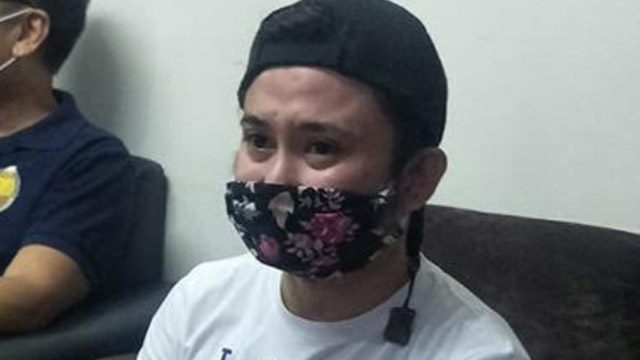SUMMARY
This is AI generated summarization, which may have errors. For context, always refer to the full article.

MANILA, Philippines (UPDATED) – The inquest prosecutor has ruled as valid the warrantless arrest of 25-year-old public school teacher Ronnel Mas, who was arrested May 11 by the National Bureau of Investigation (NBI) over a post on Twitter offering P50 million to kill President Rodrigo Duterte.
In a 7-page resolution, Assistant State Prosecutor Jeannette Dacpano said that while the warrantless arrest itself was invalid, “the defect was ultimately cured when Mas extra-judicially admitted to the media that he indeed personally posted the provocative text in his own Twitter account.”
Dacpano said: It is undeniable that the arrest of Ronnel Mas made by the NBI-Dagupan operative does not fall within the ambit of warrantless arrest contemplated by law.”
Dacpano also ruled that inciting to sedition is not a continuing crime.
In an earlier text message to Rappler, Prosecutor General Ben Malcontento, who approved Dacpano’s resolution, said the warrantless arrest was upheld as valid.
The ruling emboldened the NBI agents to refuse to release Mas on Friday, May 15, even though his lawyers argued that the invalid warrant of arrest means there is no legal ground to keep him detained.
Dacpano said Mas’ admission to media does not amount to a custodial investigation. In a custodial investigation, a person has several rights, including the right to a lawyer. In that admission, Mas was without a lawyer.
Dacpano cited the Supreme Court case People vs Taboga where the Court admitted a media confession as evidence.
Dacpano did not tackle a much earlier admission made inside the car of NBI agents immediately after the arrest, where it was the agent who elicited the confession without a lawyer present.
“Charges of inciting to sedition [will be filed] in Zambales likely first thing next week,” Malcontento said. (READ: Salesman arrested, jailed for calling Duterte ‘crazy’)
More days in jail
Mas was arrested May 11 and will likely spend the weekend in jail.
Article 125 of the Revised Penal Code imposes a deadline – 12 hours, 18 hours, or 36 hours depending on the offense – for when a person arrested should be charged in court.
That deadline has lapsed in Mas’ case, and he cannot post bail until a charge is filed in court.
But Malcontento said “you need not wait for the inquest resolution before one can post bail.”
Asked for other ways to post bail, Malcontento said “that’s his call and the call of his defense team because from the start that is bailable.”
Other possible ways to post bail without being charged is filing a petition for bail before a court, or a petition for the writ of habeas corpus.
Asked why Mas cannot be charged sooner given the limitations of the lockdown on courts, Malcontento said: “Courts are open for bail purposes.”
When someone is arrested without a warrant, he automatically undergoes inquest, which is a speedy hearing. If the person wants a full-blown hearing, he can waive his rights under Article 125 and request for a preliminary investigation.
But Malcontento said there is “no more preliminary investigation.”
Warrantless arrest
In the past, particularly in the Bikoy Ang Totoong Narcolist videos, the DOJ had upheld a warrantless arrest saying that online posts count as continuing crimes. (PODCAST: Law of Duterte Land: DOJ and warrantless arrests)
One of the grounds for a valid warrantless arrest is if you are caught in the act. Caught in the act was then validly applied to offenses classified as “continuing crimes,” for example, rebellion.
“Even when the person is not doing anything unlawful, he’s walking on the street, he’s brushing his teeth, she’s singing karaoke, as long as that person is said to be a rebel then that person is committing a crime in the presence of the officer,” said former Supreme Court spokesperson Ted Te in an earlier Rappler Talk interview.
Continuing crime in the context of cyberlibel or inciting to sedition is a deviation from precedent, said human rights lawyer Chel Diokno, the chairman of the Free Legal Assistance Group (FLAG).
“Continuing crime is really intended for a crime like kidnapping; while you are holding a person against his will and for every single day or hour that you’re doing that, they can arrest you,” said Diokno in a Rappler Talk interview.
In the warrantless arrest of webmaster Rodel Jayme, who had helped upload the Bikoy videos, the DOJ said: “Videos and articles were still circulating online and excerpts of the videos were still being shown on television or heard over the radio, clearly, an offense is still being committed, and an arrest of respondent without a warrant is justified.”
“I totally disagree with the government’s interpretation of that…when you put something on the internet, that’s just one act, and if you ask them, how many count will you file, they will tell you it’s just one count because it’s one publication, I don’t think that is a valid way of interpreting the law on warrantless arrest,” Diokno said.
Te said one of the earlier cases that “propagated” the principle of a continuing arrest is the case Umil vs Ramos involving communist rebels, where the Supreme Court said rebellion can be a continuing crime.
“It’s high time that the Supreme Court revisits that justification because it’s very very dangerous, for purposes of arrest, it’s dangerous if it’s unclear which offenses are continuing,” Te said, adding that inciting to sedition was not mentioned in the said case. – Rappler.com
Add a comment
How does this make you feel?
There are no comments yet. Add your comment to start the conversation.